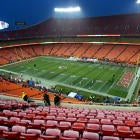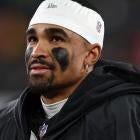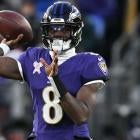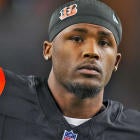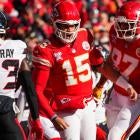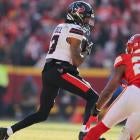In these uncertain times, I hope this article finds you and yours healthy in this new normal.
The NFL is in unprecedented and uncharted territory ... OK, you get it. We've all heard and have been using the clichés these last two-plus months. I hope we can retire them ASAP.
As an NFL scribe, I've gotten a number of questions from CBSSports.com readers, CBS Sports HQ viewers, friends and family about what's happening with the NFL during the age of COVID-19. There is no story I write and no radio hit I do that doesn't touch on coronavirus in some way.
I've decided to put together as many questions as you may have and answer them with as up-to-date information as I have. Below I have posed nearly two dozen frequently asked questions that I hope take care of your curiosity. As time goes, I'll be sure to update this with new questions and information.
Let's begin.
How can you play the game and respect social distancing measures?
You can't, and the NFL understands that. Allen Sills, the league's chief medical doctor, said as much Tuesday. "When you do get to football, you do have some unique challenges," Sills said on a conference call with reporters. "Football and physical distancing are not compatible with each other, so we know we'll have people in close proximity with each other. There are some unique challenges we face."
I've read Major League Baseball has a 67-page document proposing details on how the sport will start back again. The NBA is reportedly getting closer to playing again. Why doesn't the NFL have a more detailed plan on how things are going to go?
Because they don't have to have one right now. Several sources have said to me some variant of "I'm glad we don't have to lead on this one." The point there is that this struck in the heart of the NFL's offseason as other leagues were playing or beginning to play. The NFL has the luxury of watching what other leagues domestically and internationally do, learning from their successes and failures and riding the wave of new knowledge and information before spelling out a plan for how there will be a return to play come Sept. 10.
Who is allowed at team facilities?
As it stands now, non-football staff members are allowed at facilities. Basically, the business-side folks who are important to how individual clubs operate but not known to the average fan. Not every team has opened its doors, nor are they all legally allowed to. Coaches and players are not permitted to be at team facilities for any club, with the exception of players who are receiving treatment and rehab from team athletic trainers.
When can coaches and players get back to the facilities and on the field?
That's the million-dollar question. League execs have spoken extensively about preserving competitive balance across all teams. In short, if one team isn't able to get on the practice field due to local or state law, no NFL team will be able to.
Will that change before mandatory minicamp in mid-June?
I can't anticipate what every state or local government will do with their stay-at-home orders, but at this point it seems extremely unlikely that cities with NFL teams will all be allowed to gather by mid-June. If that's the case, and if the league keeps its stance on competitive balance, there will not be physical mandatory minicamps this June.
OK. What about training camps?
This is where I think the rubber meets the road. The NFL went ahead with free agency and the draft and the schedule release -- all modified, of course -- so that the offseason would be as uninterrupted as possible. Training camp represents the official start of preseason, and most teams usually begin by the third week of July. No league executive has said anything on the record about whether training camps will start on time.
"We're not putting dates on the calendar at this point because I'm looking at it not as date-based but really science- and technology-based," Sills said Tuesday when asked about minicamp dates, though I think this answered can safely be applied to training camp dates, too. "We feel there are certain important steps that need to occur with regard to testing, with regard to test availability, with regard to test reliability, and also our continued evolution of understanding about how to manage exposure. All of things are continuing to evolve."
The start of training camp and the rules and regulations that will accompany it will be agreed upon between the league and players union. That is not in question.
What happens if some states are open and others are closed?
I want to be clear that this is not sourced reporting but informed opinion. Got it? OK.
The league is all about competitive balance. But the league also wants to see its players safely on the field this season. Players need some semblance of on-field preseason training before going out there on Week 1.
With that understood, the hope is that by mid-to-late July, most if not all states will be permitting gatherings as large as NFL training camps to assemble. If all 32 teams are legally permitted to go, then no issues. But what if a team is in a state that hasn't lifted restrictions? There have been reports that teams have been and are looking at contingency plans for camp. The Greenbrier in West Virginia has hosted the Saints and Texans in recent years, and it'd likely be the top choice for an East Coast team.
Whoa, whoa, whoa, hold on. Didn't we just get done talking about competitive balance? How would it be fair and equitable if 31 teams are at their usual facilities while one has to go to a hotel in Appalachia?
That's where my informed opinion gets tricky. Simply put, it obviously wouldn't be fair. But if relocating a team for a few weeks for training camp means the season can start on time, I think concessions will be made. A minority of teams still hold training camp away from their home facilities. We've also seen an uptick in recent years in joint practices. The point being that the idea of going somewhere else for training camp isn't entirely foreign to players.
What happens if there's more than one team? What if, say, California doesn't allow training camps and the Rams, 49ers and Chargers are displaced?
At some point there gets to be a number of teams where you hit a breaking point and say this just isn't feasible. I don't know what that number would be. At this point, let's wrap up that hypothetical rabbit hole and come back to it in a few weeks as things become clearer.
Deal. So how are players staying in shape?
You've seen or read many stories on this site and elsewhere detailing workout regimens for various players. Currently they are getting paid for their voluntary OTAs that are now virtual. Players are also receiving workout bonuses. Teams have been allowed to send players up to $1,500 in training equipment, too. Several agents I've spoken to have pointed to their players buying Pelotons and Tonals for their homes.
Can players still work out together away from team facilities? I saw Tom Brady do it and the NFL said it was fine, but he gets away with everything.
Yes, players can gather for workouts and training sessions under league rules. This is no different than the pre-training camp trips quarterbacks usually take their pass-catchers on in July. Of course, all players still have to abide by the law as it relates to gatherings.
What happens when a player tests positive for COVID-19?
I'm going to let Sills, the chief medical doc, take this one.
"We fully well expect that we will have positive cases that arise because we think that this disease will remain endemic in society and so it shouldn't be a surprise that new positive cases arise," Sills said Tuesday. "Our challenge is to identify them as quickly as possible and to prevent spread to any other participants. We're working very diligently on that and we'll have some detailed plans to share about that at a later time."
So games will continue if one player tests positive?
Though Sills did not say that outright -- nor would it be fair to say he even implied this in the above quote -- it is my belief that one positive test will not prevent the NFL season from continuing. It's widely understood that one player on a roster of 90 across all 32 teams will eventually test positive once players and coaches can gather. If games were going to stop for one positive test, there'd be no reason for any sports league to be starting up again until there's a vaccine available since we understand there will be positive cases.
But didn't the NBA stop when Rudy Gobert tested positive?
Yes, but we also aren't in the same place as we were in March when Gobert tested positive. The NBA had no idea at the time of tipoff who would have been exposed and didn't have a plan in place for what happens when a player tests positive.
In theory, there will be enough tests available for the NFL to test each player and coach at least once a week (and maybe more). Those tests would surely be conducted before games are played. This is my opinion here, but I think it's a safe bet that a player testing positive would not play in that week's game and likely wouldn't return to team facilities until he tests negative. How exactly teams will handle a positive test, I honestly don't know. Sills said above that the league will have a more detailed plan at a later date.
Where will these tests come from?
"We want to make sure that we're in no way affecting the supply of tests that are needed by the healthcare system in any of our markets or in the country at large," Sills said. "So that's a strong commitment from all of us."
No sports league wants to be in the position of taking a disproportionate number of tests away from the American public. Sills noted that we are going to see "continued, rapid evolution over the next few weeks and months" as it relates to testing availability and reliability. Once again, the league and union will have to work out those particulars in the coming weeks.
Whether we get to a point in the next 30, 60, 90 days where there are enough tests for NFL teams to use is a question that can't be answered at this time.
Will fans be allowed in the stands?
Maybe, and it certainly depends on the state. Multiple team executives have told me they anticipate games being played with diminished capacity crowds. The numbers vary, but a 70,000-seat stadium could "safely" hold between 10-20,000 fans, according to sources.
Jonathan, why is safely in quotations?
Because a team can put together an algorithm that has fans seated six feet apart, but that doesn't take care of all the potential interactions those fans may have in and around the stadium, from the restrooms to the concession lines.
Would the NFL play without fans?
Informed opinion alert: Yes. The league and all 32 teams would prefer to play all 256 games in front of sold-out stadiums. At this point, reasonable minds agree that's not going to happen this fall. Not playing this season would represent a loss of billions of dollars. If the decision is between not playing or playing in front of no fans, the league is obviously going to choose the one that keeps billions of dollars in its pockets.
How much money do teams stand to lose without fans?
This, and the three above questions, were covered in the first part of my No Fan Plan series in May. Teams stand to lose between $70-100 million on average on gate receipts alone. Forbes published an article detailing gameday revenue from individual teams from 2018 that would give you a better idea of specific numbers for each team.
Isn't the salary cap drawn, in part, from team revenue? If teams take a financial blow, will the cap go down?
That's covered in Part II of the series. Teams are going to take a revenue hit. The 2021 salary cap is supposed to decline, according to the current formula. Now, both the team owners and NFLPA share a mutual interest in keeping the cap at or above its record $198.2 million from this season. The solution is both sides will likely sit down at the table and work on smoothing next year's cap hit by borrowing from future years. But those talks won't really heat up until late in the season as both sides have a better grasp of what the total revenue pool might be.
Sorry for this being a little bit out of left field but, if there are no fans, what happens to home-field advantage in the NFL?
Wow, that's a curveball.
Actually I wrote about that as Part III of my series, which you can read here.
Will the Super Bowl be played on time?
That's unclear. The NFL schedule has been built in a way that it can slide games back. It's very possible we don't finish the regular season until later in January. The NFL wishes to hold a full 17-week regular season slate plus a full postseason. The Super Bowl host committee chief told me Tampa is still planning to host Super Bowl LV (broadcast by CBS) on Feb. 7, but I'm also told by sources that Tampa as a city has the flexibility to slide the game back into February if needed.
What if I have other questions?
I'll update this post periodically in the coming days and weeks. You can email me or send me a tweet.








